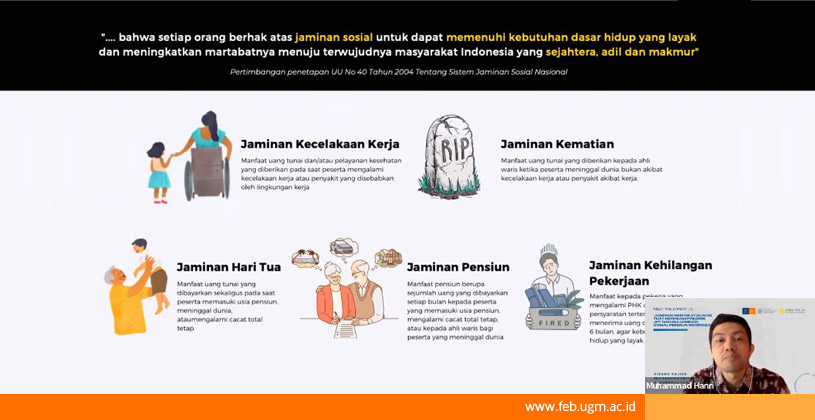Reviewing the Polemic of Old Age Security and Social Security Issues for Indonesian Workers
- Details
- Written by Kirana
- Category: News
- Hits: 2277

On Tuesday (22/02), the Center of Microeconomics Research and Dashboard FEB UGM launched its second program called Meet The Expert. This program invited various experts in microeconomics topics and discussed current issues from an economic perspective. The first Meet the Expert series discussed the perspective of economics in viewing the polemic of Old Age Security (JHT) in BPJS Employment and the current state of development of social protection policies for workers in Indonesia.
On this occasion, the webinar program was carried out in collaboration with the Institute for Economic and Community Research (LPEM) FEB UI. As the program title suggests, this webinar invited speakers who are experts on the topic of this session, namely Muhammad Hanri, Ph.D., as Head of the LPEM FEB UI Social Protection and Employment Study Group, and Qisha Quarina, Ph.D., as Coordinator for Microeconomics Dashboard FEB UGM.
Recently, the issue regarding JHT has been widely discussed by the public due to the issuance of Permenaker No. 2 of 2022 concerning procedures for payment of JHT benefits. In the presentation session on the topic titled “Permenaker in Numbers,” Muhammad Hanri explained about the change in provisions in which the disbursement of JHT for workers who stop working can only be done after entering retirement age (56 years).
Although JHT is intended to protect workers when they enter a non-productive period, during the Covid-19 pandemic, quite a lot of workers actually experienced layoffs and it will be burdensome if they have to wait until they are 56 years old to liquidate their funds. At the end of the session, according to Hanri, there are 3 points that still have room for further development for this policy in the future, which is timing between policies, financial literacy, and formalizing the informal sector.
Next was the presentation session by the second speaker, Qisha Quarina, with the topic “Examining the Challenges and Roots of the Problem of Social Protection of Workers in Indonesia.” In her material, Qisha describes three challenges of expanding social protection for workers in Indonesia. These challenges are the increasing gap in the number of formal-informal workers during the Covid-19 pandemic, the coverage of BPJS-Jamsostek membership, which is still relatively low for the participation of informal workers, and the missing social protection for voluntary layoff workers, certain time workers, and informal workers.
In addition, Qisha also explained the polemic of the JHT issue from two different perspectives. The first being from the public and the problems that occur including the distortion of expectations, wrong timing, the fact that JKP (job-loss insurance) is still new and has not been properly socialized, and the lack of public trust in institutions. Meanwhile, from the government's perspective, it is necessary to make efforts such as restoring the JHT function as it should, preparing for the unavoidable aging population era, and ensuring sustainable financing for the elderly in the future. Finally, Qisha advised that the JHT polemic should not forget the long-term need for a more comprehensive workers' social protection system.
Reportage: Kirana Lalita Pristy.


